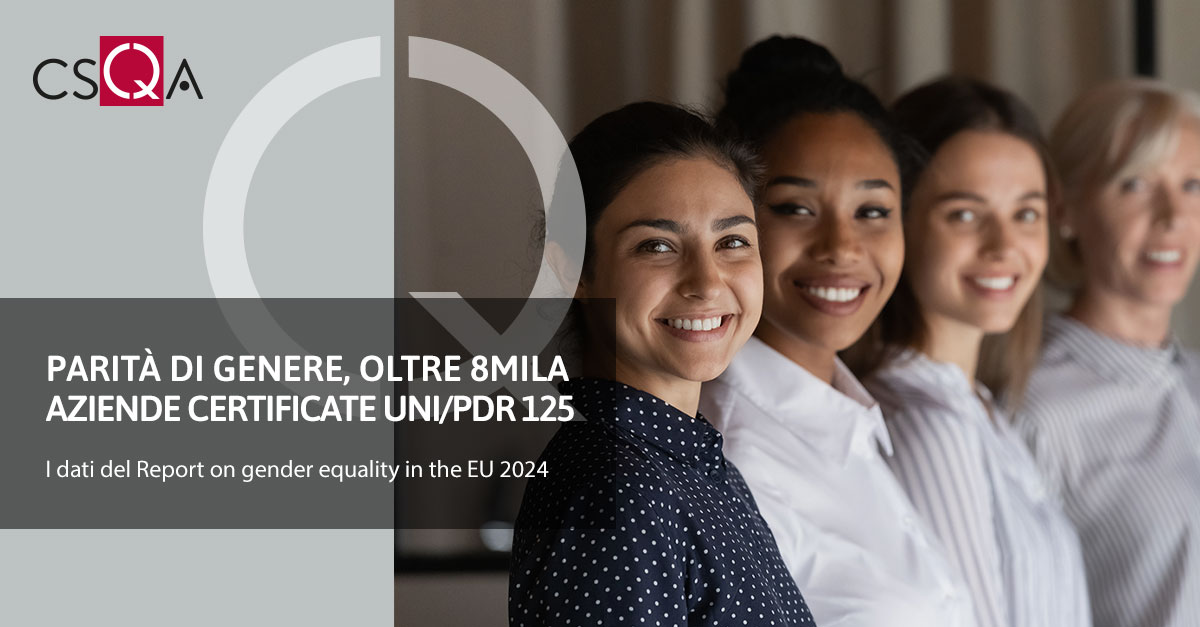 In just over two years, the certification of the management system for gender equality has reached important numbers: 50 bodies have obtained accreditation and over 8 thousand company sites have chosen to be certified according to UNI/PdR 125.
In just over two years, the certification of the management system for gender equality has reached important numbers: 50 bodies have obtained accreditation and over 8 thousand company sites have chosen to be certified according to UNI/PdR 125.In the EU ranking of gender equality, Italy ranks 13th with 68.2 points, but it is the member country with the most evident improvement : +14.9 points compared to 2010 .
For the first time, however, the EU index stood at 70.2 out of 100 points. These are the data from the "Report on gender equality in the EU 2024 " which measures the 2023 Gender Equality Index , calculated by the European Institute for Gender Equality (EIGE).
It is in this context that the Committee of Ministers of the Council of Europe has adopted the new Strategy for gender equality for the period 2024-2029, the official launch of which will be held in Strasbourg on 30 May. In line with the commitments made at the Council of Europe Summit in Reykjavik 2023, the strategy will guide the Union's work towards gender equality over the next six years.
8 thousand companies certified for UNI/PdR 125
Among the actions implemented in our country to support the growth highlighted in the "Report on gender equality in the EU 2024", there is the accredited certification of the management system for gender equality according to the UNI/PdR 125 Reference Practice :2022 “Guideline on the management system for gender equality”. A true Italian best practice with which companies can qualify themselves on the market and enhance their commitment to inclusion and overcoming the gender gap.
As Sara Vitali, technical officer of the Certification and Inspection Department , explains on Class CNBC's "W Leadership" program and in an interview with HR Link, in just over two years the certification of the management system for gender equality has recorded a December 2023:
50 accredited bodies
928 certified Italian sites and 460 foreign ones
388 certified companies in total.
“In many years of activity I have never encountered such a high demand in a relatively short period of time – says Vitali – especially considering that it is a voluntary certification”.
The advantages for companies
“The one on the gender gap is the first certification of a management system that is adopted at an institutional level – explains Vitali – and Accredia, with its role as guarantor on the market, through accreditation attests to the competence and impartiality of the bodies that they go to issue this certification".
Among the factors that support companies in undertaking the certification process under accreditation, there are certainly the incentives provided by the PNRR "recognized within a maximum reimbursement threshold in terms of audit days, which are carried out by the certification bodies, and are provided through the issuing of vouchers".
Furthermore, certification according to UNI/PdR 125 is also referred to as an element in tender notices for the purposes of reducing the guarantee , as required by the new Procurement Code, as well as giving the right to contribution exemptions up to a maximum amount.
A path of continuous improvement
The UNI/PdR 125 Reference Practice "is ambitious", also because a minimum threshold has been defined within it, below which the organization cannot be certified.
In fact, we are talking about a practice structured into six areas ranging from governance to human resources and remuneration equity. Without neglecting the aspects related to parenting and work-life balance.
For each area, performance indicators (KPIs) are identified with an assigned score that varies depending on the size of the organization and the weight that that area has overall. For example, the areas on the protection of parenting or remuneration equity "which often also represent the most critical areas in the company" have a greater weight in the total count.
The bodies that certify the management system for gender equality of organizations support a path of continuous improvement whose goals "will be achieved more quickly where a virtuous mechanism is developed thanks to the commitment that the company itself puts into this path". (Source: https://www.accredia.it/ )